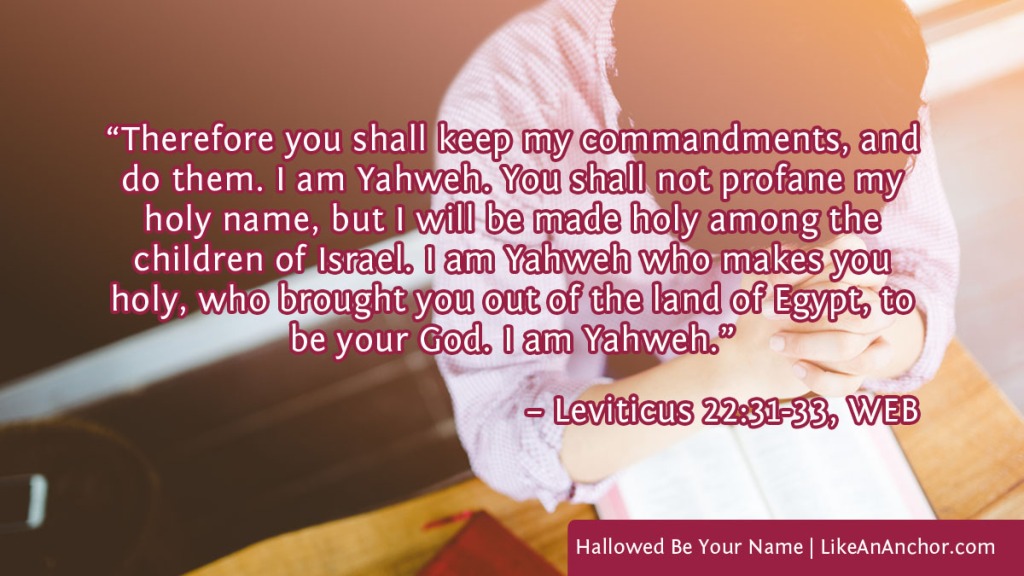Sometimes when I pray, I think of Jesus’s model prayer (often called “the Lord’s Prayer”) as an outline to keep my mind from wandering or to help me think of things I should pray for. As I was doing this about a week ago, I started pondering the phrase “may your name be regarded as holy.” I wanted to think about that idea more deeply. When I pray this, am I praying that I would see God’s name as holy, or that others will? What does it mean to really consider God’s name as holy? Also, why does it say “your name” rather than “you”?
Requesting What Should Be
When you think of the model prayer, you probably think of the traditional phrase “hallowed be your name” rather than “may your name be regarded as holy.” I’m not sure where I first heard this alternate translation. It’s not actually used in any of the English-language translations on Bible Gateway for Matthew 6:9 or Luke 11:2. In the Greek, though, a literal translation is likely closest to “may your name be held in reverence” or “may your name be considered holy” (NET footnote). I probably heard someone use the “regarded as holy” version in a sermon or read about it in a book or article (like this one, for example).
The word “hallowed” isn’t used much in modern English, but it means “regarded as holy; venerated; sacred” (Dictionary.com). It is not simply a statement like “holy is your name,” as we modern readers might assume. Rather, it is a prayer for what should be. The two translations that I quote most often on this blog modernize “hallowed be thy name” (KJV) as, “may your name be kept holy” (WEB) and “may your name be honored” (NET). Those are both good ways to bring this concept into modern English.
“Therefore you shall keep my commandments, and do them. I am Yahweh. You shall not profane my holy name, but I will be made holy among the children of Israel. I am Yahweh who makes you holy, who brought you out of the land of Egypt, to be your God. I am Yahweh.”
Leviticus 22:31-34, WEB
God’s name is holy, and regarding His name as holy is the proper state of things. It will happen among His people, and it ought to happen among the nations as well. Take a look at one of the things God says about His people to the prophet Ezekiel.
“I scattered them among the nations, and they were dispersed through the countries. I judged them according to their way and according to their deeds. When they came to the nations where they went, they profaned my holy name; in that men said of them, ‘These are Yahweh’s people, and have left his land.’ But I had respect for my holy name, which the house of Israel had profaned among the nations where they went.
“Therefore tell the house of Israel, ‘The Lord Yahweh says: “I don’t do this for your sake, house of Israel, but for my holy name, which you have profaned among the nations where you went. I will sanctify my great name, which has been profaned among the nations, which you have profaned among them. Then the nations will know that I am Yahweh,” says the Lord Yahweh, “when I am proven holy in you before their eyes.”
Ezekiel 36:19-23, WEB
God cares a great deal about how people regard His name. Even when His people don’t seem to care about how they represent Him, He still acts with “respect for my holy name,” takes steps to “sanctify my great name,” and proves Himself holy both to His own people and to the nations observing.
His Great Name
In Hebrew thought, names “often include existence, character, and reputation” (Theological Wordbook of the Old Testament, entry 2405 shem). This is especially true of God’s names. He shares several names with people that reveal aspects of His character, such as El Shaddai (God Almighty). He also shares His personal name, YHWH, typically pronounced as Yahweh (also written as Jehovah, a hold-over from English’s Germanic roots when “J” was pronounced more like “Y”). This name is represented in most English translations as LORD, with all caps to distinguish it from Adonai, the actual Hebrew word for “lord.” One reason I like using the WEB translation for the Old Testament is that they use “Yahweh” instead of “LORD,” making it much easier for us to see when God is using His name rather than a title.
With the concept of “name” tied so closely to someone’s character and reputation, it shouldn’t surprise us that in some Biblical “passages shem Yahweh is so inextricably bound up with the being of God that it functions almost like an appearance of Yahweh (Ex 23:20-21; Isa 30:27)” (TWOT 2405). Similarly, “The name of God also signifies the whole self-disclosure of God in his holiness and truth (Ps 22:22)” (TWOT 2405). Because God Himself is holy, His name should also be regarded as holy.
There are warnings to go along with humans using this name. One of the 10 commandments says, “You shall not take the name of the Lord your God in vain” (Ex. 20:7). We often think of this just as a command not to use God’s name as a swear word, but there’s a lot more to it than that. The word translated “take” can refer to using or carrying something, and since names are tied to character and reputation, this command likely refers to how we represent God (and how we regard His name) as much as it does to how we use His name in our speech.
“You shall not misuse the name of Yahweh your God, for Yahweh will not hold him guiltless who misuses his name.”
Exodus 20:7, WEB
Some modern Jews and Messianic believers refer to God as Ha Shem (Hebrew for “the name”) rather than risk taking His name in vain by using one of His names or titles. But Yahweh introduced Himself by name to His people and directly told Moses to use this name, so I wonder sometimes if not using this name (so long as it’s in an appropriately reverential manner) might be a worse blunder than using it. He wants to have a familial relationship with us, not a super formal one.
Moses said to God, “Behold, when I come to the children of Israel, and tell them, ‘The God of your fathers has sent me to you,’ and they ask me, ‘What is his name?’ what should I tell them?”
God said to Moses, “I AM WHO I AM,” and he said, “You shall tell the children of Israel this: ‘I AM has sent me to you.’” God said moreover to Moses, “You shall tell the children of Israel this, ‘Yahweh, the God of your fathers, the God of Abraham, the God of Isaac, and the God of Jacob, has sent me to you.’ This is my name forever, and this is my memorial to all generations.”
Exodus 3:13-15, WEB
I do want to add a quick note here to address the idea that we should only use Hebrew names for God. We can use the names He used to originally reveal Himself, but we don’t have to. He’s perfectly fine with translations, as we can see from the New Testament. For example, the name “Yahweh” doesn’t show up in New Testament writings at all. They use the Greek equivalent of “God,” “Father,” and “Lord” instead. It’s perfectly okay with God to talk about Him and to Him in any language you know (not just Hebrew or Greek) (Acts 2:1-12).
What Do I Know of Holy?
I’ve talked about the concept of holiness before, but mostly in the context of God making something holy. If a thing or person is holy, they are set apart or sanctified for God’s divine use. But what does it mean that God Himself is holy?
The Greek word translated “hallowed” or “kept holy” is hagiazo (G37). The basic meaning is “to make holy, sanctify.” Usually, it’s about something that wasn’t holy withdrawing (or being set apart) from common things to make them holy. For something that’s already holy, the verb can also mean “to regard and venerate as holy” (Zodhiates, G37 III). God is already and inherently holy, but humans get to choose whether or not they take action to recognize His holiness.
In Hebrew, “holy” is qadash (verb; TWOT 1990), qodesh (noun; TWOT 1990a), or qadosh (adjective; TWOT 1990b). This word “connotes the concept of ‘holiness,’ i.e. the essential nature of that which belongs to the sphere of the sacred and which is thus distinct from the common or profane” (TWOT 1990a). In relation to God specifically, “the biblical viewpoint would refer the holiness of God not only to the mystery of his power, but also to his character as totally good and entirely without evil” (TWOT 1990a). He is ethically perfect, “intrinsically holy,” “free from the moral imperfections and frailties common to man,” and totally distinct from sin or profane things (TWOT 1990b).
To regard God as holy, we need to recognize truths of His essence and character. We need to have a grasp and appreciation of the fact that He is holy to the core of His being. And when we pray, “may your name be held in reverence” or “may your name be considered holy,” we’re praying that others will recognize these truths as well.
Our Response to Holiness
God’s holy name also demands something of us. As the model prayer goes on, Jesus counsels us to also pray, “may your will be done on earth as it is in heaven” (Matt. 6:10, NET). Part of God’s will is that we become holy, set apart and sanctified for Him.
For I am Yahweh your God. Sanctify yourselves therefore, and be holy; for I am holy. … I am Yahweh who brought you up out of the land of Egypt, to be your God. You shall therefore be holy, for I am holy.
Leviticus 11:44, 45, WEB
So then, be perfect, as your heavenly Father is perfect
Matthew 5:48, NET
When we recognize God’s holiness and perfection, we should also realize that we ourselves are far from living up to His standard. If we seek a relationship with Him, we should also seek to live in a way that sets us apart from sin and uncleanness so we become more and more like our perfect God. We don’t need to become obsessed with doing everything just right; the Pharisees, for example, tried keeping the law perfectly but ended up missing the whole point (Matt. 23). But we do need to recognize our need for holiness, turn away from things antithetical to God’s nature, ask for and receive forgiveness through Jesus Christ, and then commit to walking with God as His special people.
There’s a special blessing that God commanded the Old Testament priests to speak over His people. At the end of the blessing, Yahweh said this was how “they shall put my name on the children of Israel” (Num. 6:27, WEB). When God calls or puts His holy name over something, that “signifies ownership, possession, and protection” (TWOT 2405). We belong to Him as His own special people (Ps. 100:3; 1 Cor. 6:19-20; 1 Pet. 2:9). He wants us to share in His holiness and charges us with carrying His name into the world as we shine His light into the darkness around us.
Featured image by Pearl from Lightstock
Song Recommendation: “What Do I Know of Holy” by Addison Road






Good points throughout…I would add that the word name in Greek (New Testament) includes in its definition AUTHORITY.
When we are baptized into the name of Jesus Christ,we are in essence of the very word placing ourselves under the Authoritary power of Jesus as our supreme Lord and ruler, to whom all our allegiances and obedience belongs (Col.2).
The word NAME has much greater force and authoritarian power behind it than most allow for in their consideration of Christianity.
LikeLiked by 1 person
Just as a clarification… IF we take on THE NAME, and yet are not submissive in a lifestyle of obedience (if you love me keep my commandments), then we are in deed taking His NAME in vanity.
Matthew 7:22-23[22]
Many will say to me in that day, Lord, Lord, have we not prophesied in thy name? and in thy name have cast out devils? and in thy name done many wonderful works? [23]And then will I profess unto them, I never knew you: depart from me, ye that work iniquity.
LikeLike
whoa!!! Great point and great conviction!
LikeLiked by 1 person